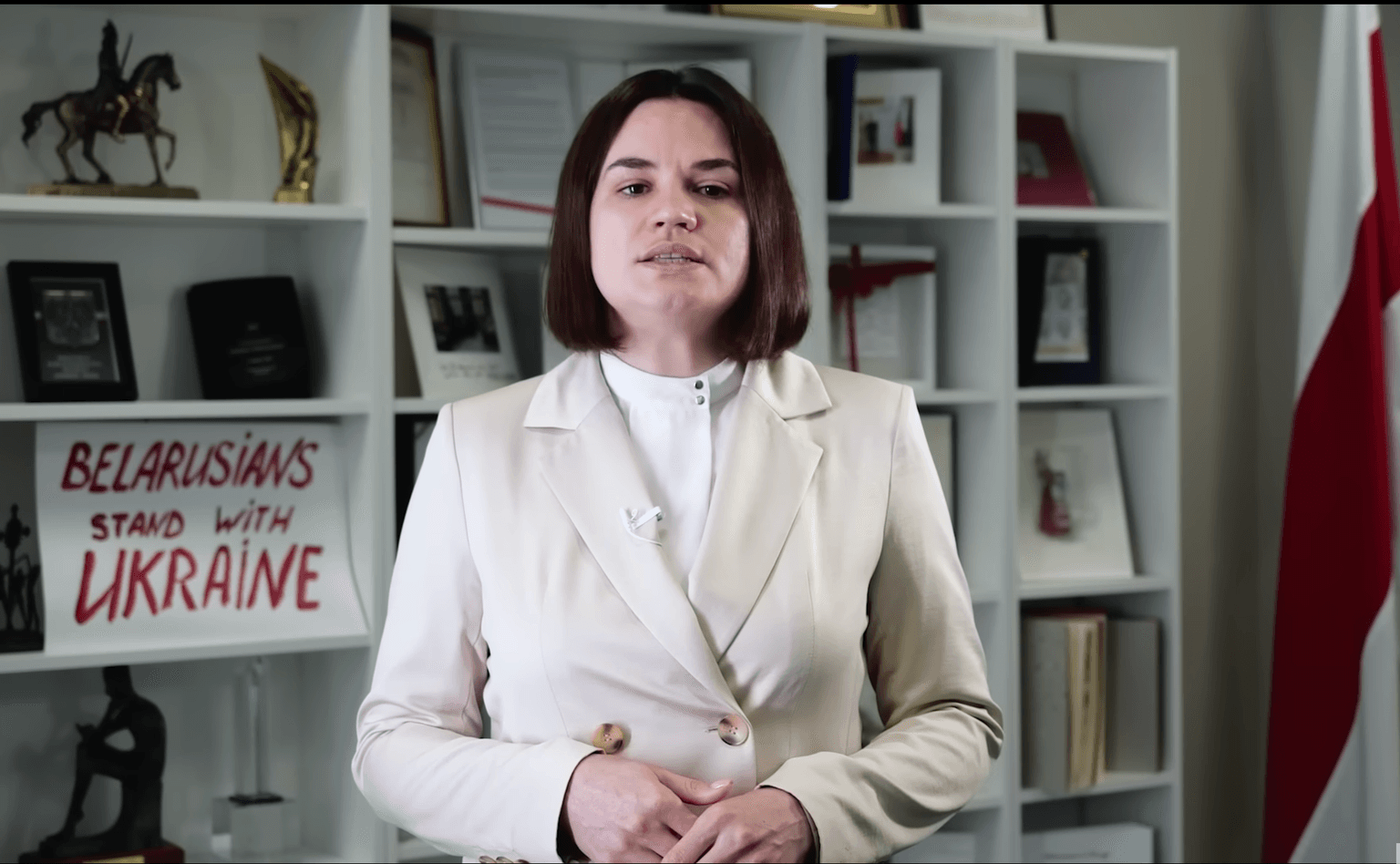Discontent grows between Kyiv, Belarus opposition as Russia drags Belarus further into war

Russia is attempting to sow hatred between Belarusians and Ukrainians, Belarusian opposition leader Sviatlana Tsikhanouskaya said in a statement on June 28.
“We cannot be divided, as it only helps the enemy,” Tsikhanouskaya said in her public response to an earlier address by President Volodymyr Zelensky. "Belarusians will do everything possible to help Ukraine, we need nothing in return but respect for our path,” she added.
Tsikhanouskaya’s video address signals a new low in the relationship between Ukraine and Belarus, this time also involving the country’s opposition.
On June 26, Zelensky published an appeal to Belarusians in the aftermath of airstrikes fired by the Russian military using Belarusian territory. Six Russian aircraft took off from Shaikovka airport in Russia’s Kaluga region, entered Belarusian airspace, and fired 12 cruise missiles at Ukraine.
As a result of the attack, at least one person was killed. This was the first large-scale attack from Belarus since April.
As the Russian war effort drags on, Ukrainians are split in their assessments of the responsibility that Belarusians bear for Russia using their territory to wage war against Ukraine. Belarusians who support Ukraine, meanwhile, are increasingly downtrodden by both their own state and that of Ukraine.
Read More: As Belarus' regime sides with Putin, people try to help Ukraine win
In 2021 alone, Ukraine issued 4,300 residence permits to Belarusians, many of whom fled the country to avoid persecution or to help Ukraine defend itself from Russian aggression.
A growing number of them are now being forced out of Ukraine.
While Ukraine’s migration department announced the resumption of residence services in May, many Belarusian nationals have been refused renewals. Ukrainian authorities have reportedly requested Belarusian citizens “prove their intent is not to harm Ukraine,” despite there being no legal requirements for the provision of such documents.
According to Palina Brodik, coordinator of the Kyiv-based human rights group Free Belarus Center, there is no clear system for the processing of residence permits for Belarusian nationals. Brodik says that while sometimes a letter vouching for an individual from a Ukrainian volunteer organization is sufficient, other times an entire stack of documents is deemed insufficient.
Zelensky’s plea
In his June 26 address, Zelensky stated that Belarusians are being aggressively dragged into Russia's war.
"I know the people of Belarus support Ukraine," Zelensky said. "They support us, not the war, and that’s why Russian leadership wants to drag you all, Belarusians, into the war and wants to sow hatred between us.”
The address was issued amid growing fears of a potential Belarus invasion that could tip the balance of power in Russia’s ongoing full-scale yet small-gain invasion of Ukraine. There is a growing notion among Ukrainians of dissatisfaction with Belarusians’ generally dull response to the country’s territory being used as a firing range on Ukraine.
Zelensky’s address to Belarus wasn’t well-received, forcing Tsikhanouskaya to respond. In her address, Tikhanouskaya said many Belarusians were assisting Ukraine, sabotaging Belarus’ railroad transportation used by the Russian military, and collecting information on Russian troop movement inside the country.
In an attempt to disrupt the movement of Russian troops through Belarusian territory, sabotage groups burned down railway signal control cabinets. The activists’ actions allegedly thwarted the Russian blitzkrieg.
Tikhanouskaya also mentioned that over 1,500 volunteers joined the Ukrainian army to fight for their southern neighbors. Most are part of the Kastus Kalinouski regiment, named after a 19-century Belarusian national hero.
“Everyone responsible for this aggression, for using Belarusian territory as its staging ground, for the violence against Belarusians and Ukrainians have to be held accountable," Tsikhanouskaya said.
"And those are Lukashenko and his subordinates, not the Belarusian nation,” she said, responding to the growing frustration among Ukrainians towards the country’s population.
Lukashenko’s warmongering
Officially, Minsk has thus far managed to abstain from directly joining Russia’s war against Ukraine. However, the country has held multiple military drills and Belarus dictator Alexander Lukashenko said his country may strike Kyiv “in case of a threat.”
Belarusian propaganda relentlessly demonizes Ukraine, publishing films about alleged launches of armed drones into Belarus and Kyiv’s sabotage groups at the border. Both claims have been denied by Ukraine.
Lukashenko himself fuels an image of Ukraine as a hostile state. In March, he claimed that Ukraine was preparing to attack Belarus and that the Russian invasion was necessary to stop any Ukrainian military action.
At the beginning of June, he said that Ukrainians killed two Belarusian truck drivers who were stuck in Ukraine and died from a Russian airstrike. Last week, Lukashenko added he would retaliate with an airstrike on Kyiv in the event of an attack from Ukraine.
According to a poll by Chatam House, contrary to Lukashenko's bellicose rhetoric, 94% of Belarusians do not want the Belarusian army to participate in the invasion.
At the same time, the Belarusian Change Tracker initiative reported that 50% of Belarusians are afraid that their country is going to be dragged into the war.










